Legal case management software has become essential for modern law firms looking to streamline operations and manage increasing caseloads efficiently. The legal profession demands precise organization, deadline tracking, and seamless client communication. A robust case management system helps legal practices automate routine tasks while maintaining compliance and security. As firms grow and the complexity of cases increases, the need for a reliable and efficient case management system becomes more critical. Modern case management software offers a wide range of features that simplify administrative tasks, improve collaboration, and provide greater visibility into case progress.
By automating routine processes and centralizing all case-related data in one platform, these tools free up valuable time for lawyers to focus on strategy and client service. However, with an array of software options available, legal professionals need to identify the best tools that align with their practice’s workflow. In this article, we’ll delve into the top case management software for lawyers, highlighting the key features and benefits of each to help you choose the perfect fit for your firm.

Understanding Legal Case Management Software and Practice Management Solutions
Legal case management software is a tool designed to help law firms streamline their daily operations, manage cases, and improve efficiency. It typically includes features like document storage, time tracking, task management, and billing, all in one centralized platform.
By organizing case information in a digital format, these systems make it easier for lawyers to access critical data, collaborate with colleagues, and ensure that nothing falls through the cracks.
In addition to managing case-specific details, legal case management software often integrates with other tools, such as calendaring, communication platforms, and billing systems. This integration creates a seamless workflow, allowing law firms to automate routine tasks, reduce administrative burdens, and enhance client service. Whether it’s tracking deadlines or generating invoices, these systems are essential for modern legal practice management.
Comrade Digital Marketing Agency can help you with the above if you’re unsure how to go about it. Schedule a free consultation.
What Are the Benefits of Using Case Management Software
Case management software has become an essential tool for law firms seeking to streamline operations and improve client service. By automating key tasks and centralizing information, cloud-based legal software helps law firms optimize their legal workflow while maintaining security. Let’s explore six major benefits of using case management software that can transform the way legal professionals manage their cases:
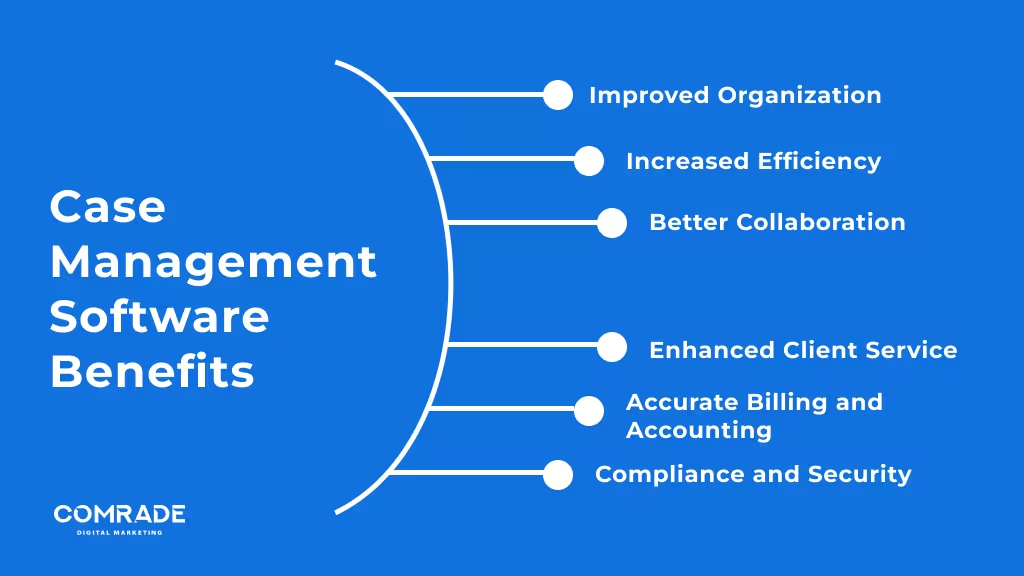
Improved Organization: Streamlines case documentation, timelines, and client information for easy access and management.
Increased Efficiency: Automates routine tasks, such as scheduling, billing, and document generation, reducing manual work and saving time.
Better Collaboration: Facilitates communication among team members by providing shared access to case files, notes, and updates.
Enhanced Client Service: Improves response time and communication with clients by keeping all case-related information organized and accessible.
Accurate Billing and Accounting: Ensures precise tracking of billable hours, expenses, and payments, leading to accurate invoices and financial reports.
Compliance and Security: Help maintain compliance with legal regulations and provide robust data security measures to protect sensitive information.
Adopting case management software can significantly enhance a law firm’s productivity and client satisfaction. By providing better organization, streamlining processes, and ensuring compliance, this technology helps law firms stay ahead. Embracing these tools not only improves internal workflows but also builds stronger client relationships, leading to better overall performance and success.
10 Leading Case Management Software for Attorneys
Case management software is a must-have for law firms looking to streamline operations, improve client communication, and ensure no case detail slips through the cracks. With the right tool, your practice can operate smoothly and effectively. Discover the top 10 legal case management solutions that cater to the unique needs of attorneys. Read on to find the best fit for your firm!
1. MyCase
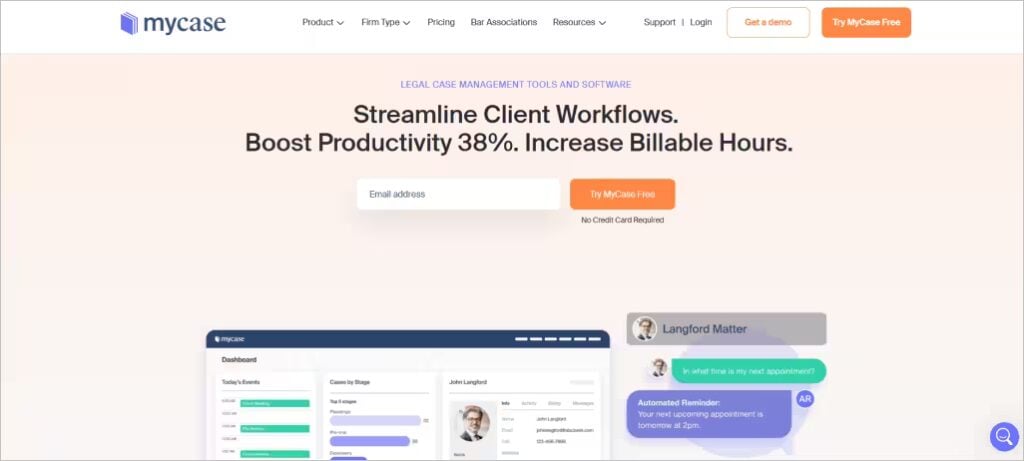
MyCase is a cloud-based case management software designed to streamline legal practice operations for small and mid-sized law firms. It offers an intuitive interface that simplifies case tracking, document management, timekeeping, and client communication. With built-in billing and invoicing features, MyCase ensures lawyers can efficiently manage their caseloads while maintaining compliance and organization.
Its secure client portal allows for seamless communication, document sharing, and appointment scheduling, enhancing client satisfaction. MyCase integrates with various third-party applications, including QuickBooks and Outlook, making it a flexible solution for law firms looking to optimize their workflow.
Pros:
Easy-to-use interface with a short learning curve
Integrated billing and payment processing system
Secure client communication portal
Cons:
Limited customization options for reports
No built-in accounting features (relies on integrations)
Mobile app functionality is somewhat restricted
Pricing: Starts at $39 per user/month with higher-tier plans offering more advanced features.
2. Legal Files

Legal Files is a robust case management system designed for law firms, government agencies, and corporate legal departments. It provides a centralized platform for managing case documents, correspondence, contacts, and workflows. This software is highly customizable, allowing legal teams to tailor it to their specific needs.
One of its standout features is its ability to integrate with Microsoft Office, enabling seamless document creation and email management. Legal Files is best suited for larger firms or legal departments that require a scalable and highly adaptable solution.
Pros:
Extensive customization for workflows and reports
Strong document management and email integration
Ideal for corporate and government legal teams
Cons:
Steeper learning curve due to customization options
No built-in billing or accounting tools
The cloud-hosted option is not as robust as some competitors
Pricing: Custom pricing based on the needs of the firm, typically requires a consultation.
3. CASEpeer

CASEpeer is a case management solution tailored for personal injury law firms, offering specialized tools for managing medical records, settlements, and client communications. The software emphasizes efficiency by automating tasks such as deadline tracking, document storage, and task assignments.
Designed with personal injury firms in mind, CASEpeer provides robust analytics and reporting tools to help firms measure performance. It integrates with tools like MailChimp, QuickBooks, and Microsoft Outlook, enhancing workflow management.
Pros:
Specifically built for personal injury firms
Automated task management and deadline tracking
Strong analytics and reporting features
Cons:
Limited flexibility for firms outside of personal injury law
No built-in accounting system
Higher-tier features can be costly
Pricing: Starts at $79 per user/month, with additional costs for premium features.
4. Trialworks
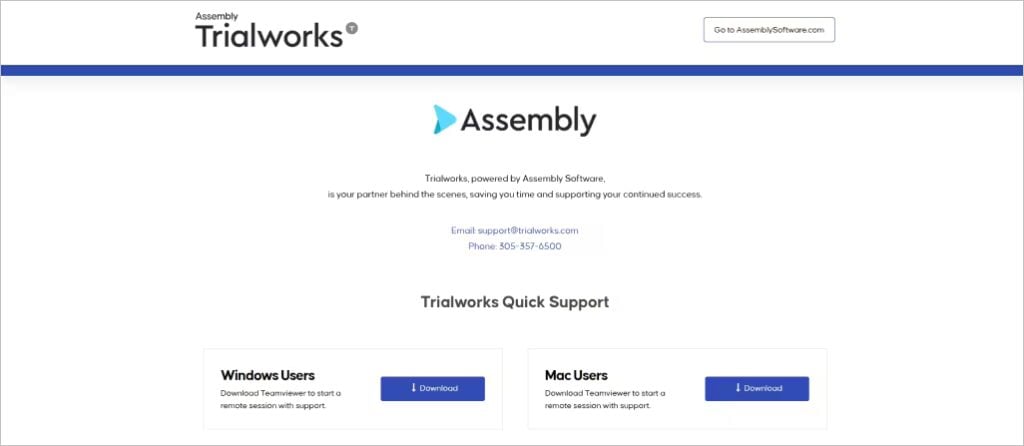
Trialworks is a litigation-focused case management software designed for law firms handling complex legal cases. It offers a structured workflow system that helps attorneys organize case files, depositions, discovery documents, and trial preparation materials efficiently. The platform provides extensive document automation, ensuring legal teams can generate pleadings, motions, and correspondence quickly.
One of its key strengths is its ability to manage high volumes of data securely. It integrates with Microsoft Outlook and Word, making it easy to store and retrieve documents. Trialworks is particularly suited for firms specializing in litigation and trial preparation.
Pros:
Excellent document automation and organization features
Ideal for litigation-heavy firms
Strong security and compliance measures
Cons:
Dated user interface compared to newer cloud-based solutions
Requires on-premises installation or limited cloud access
The higher learning curve for new users
Pricing: Custom pricing based on firm size and needs.
5. Legal Tracker
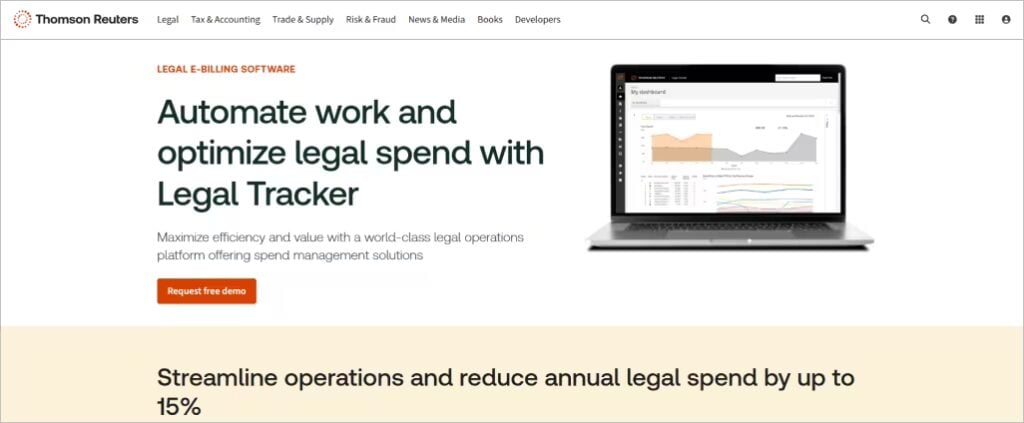
Legal Tracker, developed by Thomson Reuters, is a comprehensive case management solution designed for corporate legal departments. It focuses on streamlining legal spend management, matter tracking, and compliance reporting. The software provides in-depth analytics, allowing companies to monitor legal expenses, outside counsel performance, and workflow efficiency.
One of its standout features is the ability to centralize legal operations, making it an excellent choice for large organizations managing multiple legal matters. Legal Tracker integrates seamlessly with other Thomson Reuters products, providing an all-in-one legal management ecosystem.
Pros:
Advanced spending and matter management analytics
Designed for corporate legal departments handling multiple cases
Strong integration with Thomson Reuters legal research tools
Cons:
It is not ideal for small law firms or solo practitioners
Complex setup requiring initial training
Pricing is higher compared to general case management software
Pricing: Custom pricing based on corporate legal department size and usage.
6. Litify
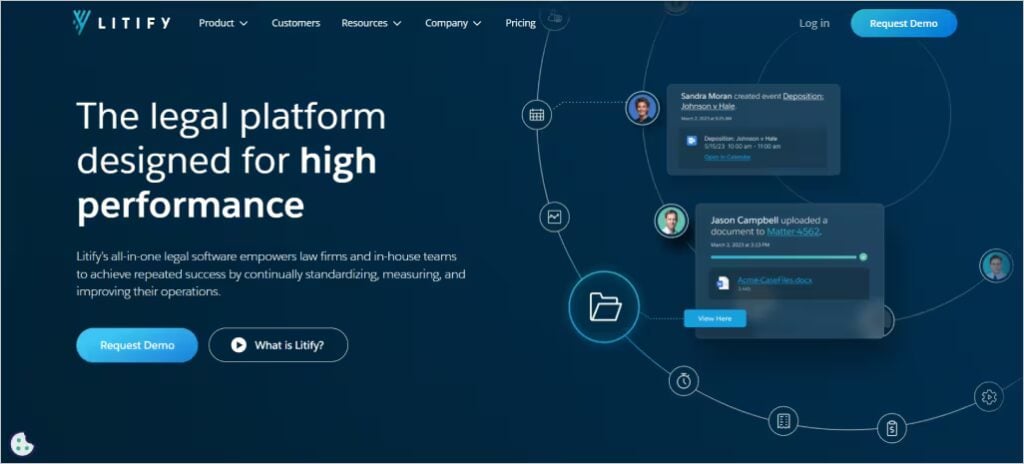
Litify is a cloud-based legal case management platform built on Salesforce, offering a highly customizable and scalable solution for law firms and corporate legal departments. It provides tools for case management, client intake, document automation, and workflow optimization. Due to its Salesforce foundation, Litify offers advanced CRM functionalities, making client relationship management more efficient.
With strong analytics and reporting capabilities, Litify helps law firms track key performance indicators (KPIs) and improve operational efficiency. It is best suited for larger firms that need a robust, enterprise-level solution.
Pros:
Built on Salesforce, providing excellent scalability and customization
Strong client relationship management (CRM) capabilities
Advanced analytics and reporting tools
Cons:
It can be overwhelming for smaller firms due to complexity
Requires Salesforce knowledge for full customization
Pricing can be expensive for smaller practices
Pricing: Custom pricing based on firm needs, typically higher due to Salesforce licensing.
7. Clio
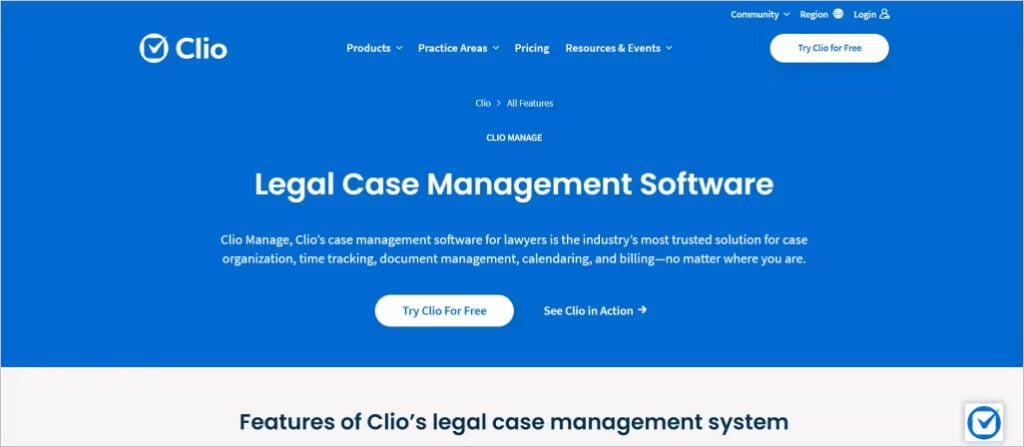
Clio is one of the most widely used case management platforms, offering a cloud-based solution for solo practitioners and law firms of all sizes. It provides features for document management, billing, client communication, and legal calendaring. Clio’s intuitive interface and extensive third-party integrations make it a top choice for many legal professionals.
A key advantage of Clio is its flexibility, allowing firms to tailor their workflows using integrations with tools like QuickBooks, Microsoft 365, and Google Workspace. Its built-in time tracking and invoicing features help streamline financial management.
Pros:
User-friendly interface with easy setup
Strong third-party integrations and automation options
Scalable for both solo practitioners and large firms
Cons:
Some advanced features require higher-tier plans
Limited offline functionality
Customer support response time can vary
Pricing: Starts at $39 per user/month, with higher-tier plans offering more features.
8. SmartAdvocate
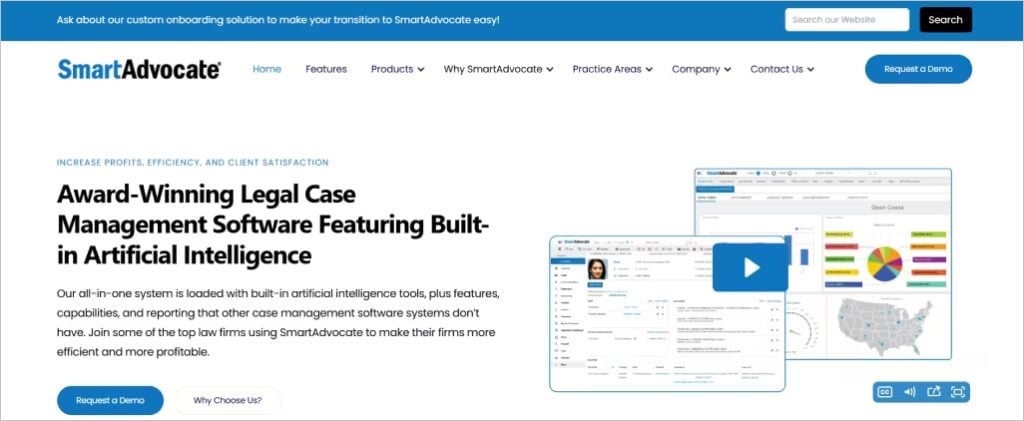
SmartAdvocate is a feature-rich case management solution designed primarily for personal injury and mass tort law firms. It provides specialized tools for medical records tracking, litigation support, and case progress monitoring. The software offers robust automation features, reducing administrative workload and improving efficiency.
With cloud-based and on-premises options, SmartAdvocate caters to firms of different sizes and needs. Its advanced reporting and document automation capabilities make it an excellent choice for high-volume litigation firms.
Pros:
Designed specifically for personal injury and mass tort firms
Extensive automation tools to streamline case handling
Both cloud and on-premises deployment options
Cons:
Steeper learning curve due to feature complexity
Not ideal for general practice law firms
Higher cost compared to some competitors
Pricing: Custom pricing based on firm size and deployment choice.
9. GrowPath
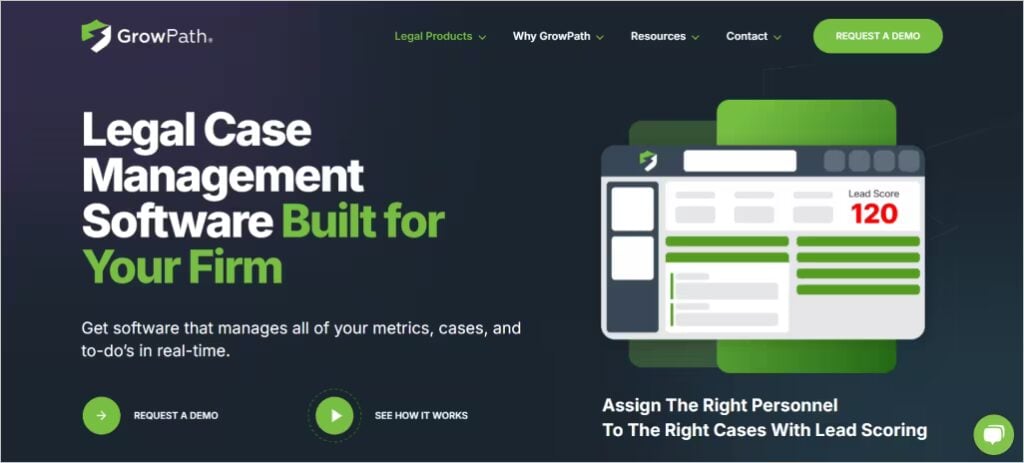
GrowPath is an innovative case management software designed for personal injury and mass tort law firms. It offers advanced automation tools, client intake optimization, and predictive analytics to help firms manage cases more efficiently. One of its standout features is the “GrowPath Buzzwords,” which helps identify high-value cases based on keywords in client interactions.
With a focus on security and efficiency, GrowPath provides built-in encrypted messaging, document automation, and task management features. It’s particularly beneficial for firms looking to optimize lead intake and streamline workflows for high-volume caseloads.
Pros:
AI-driven client intake and case evaluation features
Strong security measures, including encrypted messaging
Designed for firms handling large volumes of cases
Cons:
Limited flexibility for firms outside of personal injury and mass torts
Learning curve for firms unfamiliar with AI-driven tools
No built-in accounting features
Pricing: Custom pricing based on firm size and feature requirements.
10. Law Ruler

Law Ruler is a case management solution designed for small to mid-sized law firms, offering essential tools for case tracking, document management, and workflow automation. It provides an easy-to-use interface with built-in time tracking, calendaring, and secure client communication features.
Law Ruler integrates seamlessly with e-signature tools, billing software, and cloud storage services, making document handling and case updates more efficient. Its automation features help attorneys stay organized by setting reminders, tracking case progress, and managing client communications.
Pros:
Intuitive interface with an easy learning curve
Strong automation features for case tracking and task management
Integration with cloud storage and e-signature tools
Cons:
Lacks advanced analytics compared to enterprise-level competitors
Limited customization for large law firms
Some features require additional third-party integrations
Pricing: Starts at $69 per user/month, with additional costs for premium features.

Key Features to Consider in Legal Case Management Software
Effective case management software can transform your law firm by increasing efficiency and organization. But with so many features to choose from, how do you know what’s essential? This guide will walk you through the most important features to look for when selecting legal software, helping you make an informed decision. Stay ahead in your legal practice—read on to learn more!
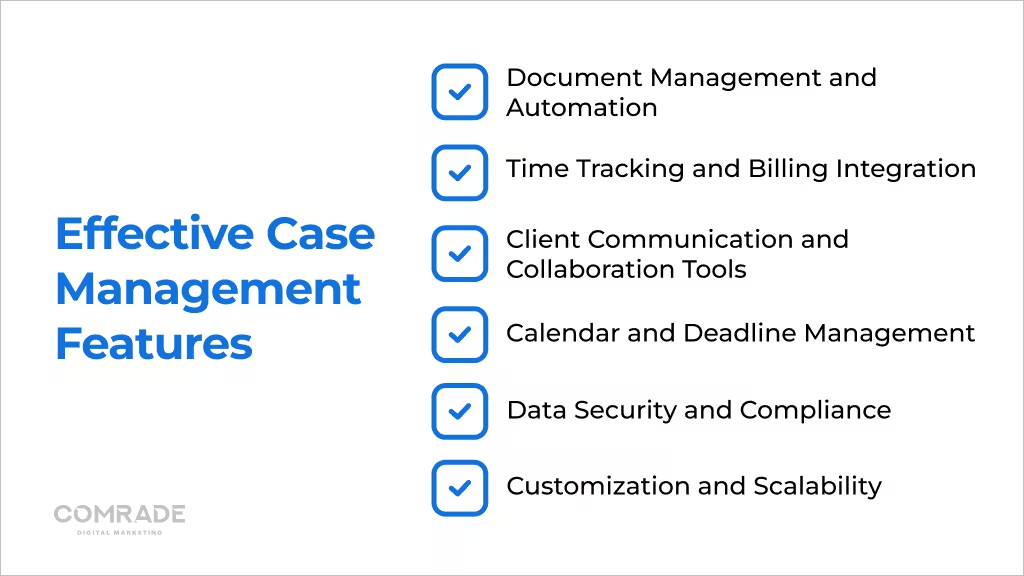
1. Document Management System and Workflow Automation Tools
Effective document management is a cornerstone of any legal case management system. A good platform should allow lawyers to store, organize, and retrieve documents effortlessly. This includes a robust search function that enables quick access to case files, contracts, client communications, and other important documents. In addition to manual organization, automation features like automatic document filing, version control, and document generation can significantly reduce administrative tasks, allowing legal professionals to focus more on client work.
Automation can improve accuracy by ensuring that documents are consistently formatted, properly filed, and easy to track throughout the lifecycle of a case.
Features like automated reminders, workflows, and document templates can streamline operations, minimize human error, and ensure timely actions for crucial documents such as court filings, contracts, and client correspondence.
2. Time Tracking and Billing Integration
Integrated time tracking and legal billing software are crucial features of any comprehensive law firm software solution. A legal case management system should allow attorneys to seamlessly track their time spent on client work, whether it’s drafting documents, attending meetings, or conducting research. This tracking should automatically link to the billing system, ensuring accurate client invoicing based on billable hours and predefined rates. It reduces the risk of missed charges and discrepancies, which can improve a firm’s cash flow and client satisfaction.
The integration between time tracking and billing systems enables more efficient billing cycles.
Firms can generate detailed, transparent invoices directly from the software, ensuring clients receive clear breakdowns of services rendered. Moreover, the ability to offer flexible billing options—such as flat rates, hourly rates, or contingency fees—enhances the software’s utility across different legal practices.
3. Client Communication and Collaboration Tools
Client communication and collaboration are vital in managing a successful legal practice. A case management system with integrated client communication tools allows law firms to securely interact with clients via email, messaging, or even video calls. It streamlines the communication process, ensuring important updates and documents are sent and received in real-time, and minimizes delays in correspondence.
The ability to track all client interactions within the system also ensures that no important message or request falls through the cracks.
In addition to individual communication, collaboration tools within the software enable internal teams to work together more efficiently. Shared document storage, real-time updates, and task delegation within case management software ensure everyone involved in a case is aligned and has access to the latest information. This fosters a collaborative environment where clients are better informed and legal teams can manage their tasks more effectively.
4. Calendar and Deadline Management
Meeting deadlines and staying organized is crucial in legal practice, where missed dates can have serious consequences. A legal case management system should offer an intuitive calendar feature that allows legal professionals to schedule and manage court dates, meetings, and other case-related deadlines. This tool helps avoid conflicts and ensures that important tasks are completed on time. Customizable reminders and notifications should be in place to alert lawyers and staff of upcoming deadlines.
A calendar system that syncs with other parts of the software, such as client communication and document management, can further streamline workflows.
By integrating with email and mobile calendars, the software ensures that case-related deadlines and events are always in view, even on the go.
This integration can prevent scheduling errors and give attorneys more time to focus on their clients rather than managing their schedules manually.
5. Data Security and Compliance
Data security is a non-negotiable feature of legal case management software. Law firms handle sensitive client information that must be protected under confidentiality agreements and legal regulations. The software should incorporate robust encryption methods, two-factor authentication, and secure cloud storage to safeguard client data. In addition, it should comply with legal industry standards such as HIPAA, GDPR, and other privacy laws to ensure the firm is operating within the bounds of legal requirements.
Beyond just security, the software should enable compliance with legal regulations governing record retention and access. This includes maintaining audit trails, creating logs of who accessed what data and when, and setting permissions for different levels of user access.
By offering this level of protection, case management software minimizes the risk of data breaches, protects client confidentiality, and ensures compliance with industry regulations.
6. Customization and Scalability
Every law firm has unique needs, which is why the best case management software should be highly customizable. It should allow firms to tailor the system according to their specific workflows, practice areas, and team structures. Customization can include adjusting the interface, creating bespoke templates, or adding practice-specific tools. This flexibility ensures that the software supports the way the firm works rather than forcing the firm to adapt to the software’s limitations.
Scalability is crucial, especially for growing firms or firms looking to expand their practice areas.
The software should be capable of handling increasing case volumes and growing teams without a drop in performance. As the firm expands, the software should offer additional features or integrations to meet evolving needs. A scalable case management system can grow with the firm, providing long-term value and adaptability for firms of all sizes.
Conclusion
Selecting the best legal case management software is crucial for streamlining your law firm case management solution and positioning your practice for growth—it’s about positioning your law firm for long-term success. With the right tools in place, your firm can operate more efficiently, ensuring every client’s needs are met promptly and effectively. However, even the best software can only take your firm so far without a solid marketing strategy to attract and retain clients. Comrade Digital Marketing is here to help.
Not only do we offer expert guidance on case management solutions, but we also provide comprehensive digital marketing services to ensure your firm stands out. From SEO to content creation, we’ll work with you to optimize your online presence, attract high-quality leads, and grow your client base. Get in touch with us today to start building a winning combination of top-notch case management software and powerful digital marketing strategies that drive real results for your law firm.
Frequently Asked Questions
-
Is legal case management software secure?
Yes, legal case management software is designed with security in mind. Reputable platforms use encryption, secure cloud storage, and strict user authentication protocols to protect sensitive client information. It’s important to choose software that complies with legal industry standards like HIPAA or GDPR, depending on your jurisdiction, to ensure data privacy and integrity.
-
How do I know if legal case management software is right for my firm?
To determine if legal case management software is suitable for your firm, assess its features, ease of use, scalability, and customer support. Consider your firm’s specific needs, such as practice area, size, and workflow complexity. Most providers offer free trials or demos, allowing you to test the software before committing to see if it aligns with your firm’s goals.
-
Can legal case management software be integrated with other tools?
Yes, many legal case management software platforms offer integration with a variety of tools, which can significantly enhance the client intake process. These law practice management software solutions can include accounting software, email platforms, document management systems, and legal research tools, all of which streamline the client intake process. Integration helps reduce manual data entry and improve overall efficiency, so it’s worth confirming integration options when selecting software for your practice.

